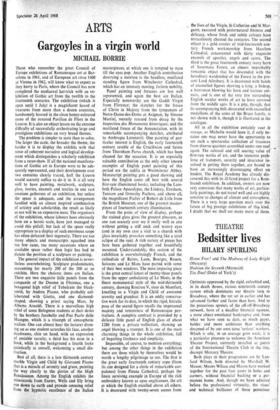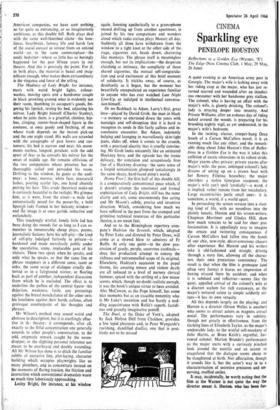Home Free. , and The Madness of Lady Bright (Mercury)
THEATRE
Bedsitter lives
HILARY SPURLING
Hadrian the Seventh (Mermaid) The Duel (Duke of York's) Optimists oppressed by the rigid, enfeebled and, in its death throes, vicious nineteenth century system which dominates our theatre turn to Broadway, where the rot set in earlier and has advanced farther and faster than here. And to the precarious sprouts of the off-off-Broadway network, born of a deadlier financial squeeze, a more abject emotional bankruptcy and, from what we have seen to date, so much gayer, bolder and more ambitious than anything dreamed of by our own tame 'serious' workers. Which is why, in an average grim week, it is a particular pleasure to welcome the American Theater Project, currently installed as guests of the International Theatre Club in the tiny, decrepit Mercury Theatre.
Both plays in their programme are by Lan- ford Wilson, both directed by Marshall W. Mason; Messrs Wilson and Mason have worked together for the past four years in holes and corners, without financial backing or a per- manent home. And, though we have admired before the professional virtuosity, the visual and technical brilliance of these penurious
American companies, we have seen nothing so far quite so entrancing, or so imaginatively ambitious, as this double bill. Both plays deal with the same well-thumbed cliché—the lone- liness, heartbreak, fantasy life and harsh fate of the social outcast in retreat from an unkind world—set in the same commonplace—the seedy bedsitter—where so little has so boringly happened for the past fifteen years in our theatre. And this is precisely the point. For if, in both plays, the material is banal and insig- nificant enough, what makes them extraordinary is the elegance and force of the telling.
The Madness of Lady Bright, for instance, starts with weird bright lights, colour- washes, moving spots and a handsome couple in black prowling around what is evidently not their room, thumbing its occupant's goods, fin- gering his lipstick, testing his bed, adjusting his mirror. Lady Bright himself (Charles Stanley), when he joins them, is a graceful, chinless, hip- less, clinging, runner-bean-shaped figure in the costume, at once gaudy and fetching, of one whose trade depends on the instant pick-up and the one night stand. His walls are scrawled with the autographs of past lovers and cus- tomers; his bed is narrow and neat; his move- ments restless, languid, petulant, with the odd spurt of fear as he consults his mirror for the onset of middle age. He remains oblivious of the two companions whose presence has so thoroughly soiled and pervaded his room. Drifting to the window, he gazes at the audi- ence: a bony, morose, white face, mascara'd lashes, pouting scarlet lips, one hand absently patting his hair. This crude theatrical make-up is curiously beautiful in the twilight_ We glimpse him, as it were, from the street—a male tart automatically posed for the passer-by, a bold Spanilh lady framed in her balcony window— and tTte image is at once garish, seductive and melancholy.
This touchingly wistful, lonely little lad has been doing the rounds for as long as I can re- member in innumerable cheap plays, poems, journalistic fictions; here his self-pity—the kind of self-pity indulged furtively in private—is hardened and made mercilessly public under the speculative, stony, implacable gaze of his Visitors. These two speak when he speaks, and only what he speaks, so that the same line or phrase reappears in a different sense, taunt or echo, the same scrap of dialogue cruelly dis- torted as in a fairground mirror, or floating back as part of another, independent discussion from which he is excluded. The effect is to underline the pathos of the central figure—his dejection, weakness, futile, coy posturings against the brutal nonchalance of the other two; his loneliness against their harsh, callous, often grotesque counterpoint of his thoughts and phrases.
Mr Wilson's method may sound weird and abstruse in description, but it is startlingly effec- tive in th theatre: it corresponds, after all, exactly to the fitful concentration one generally accords to other people's conversation, to the odd, enigmatic remark caught by the eaves- dropper, or the slighting personal reference not meant to be overheard and doubly wounding. All Mr Wilson has done is to ditch the familiar rubble of narrative line, plot-laying, character building which occupies playwrights like so many plumbers, and to concentrate instead on the moments of flaring tension, the friction and interaction which conventional dramatists waste no much time laboriously approaching.
Lesley Bright, for instance, at his window again, listening apathetically to a gramophone record, drifting up from another apartment, is joined by his two companions and wonders aloud which radio station plays Mozart all day. Suddenly all three have withdrawn from the window to a tight knot at the other side of the stage, cigarettes out, heads down, chattering like monkeys. The phrase itself is meaningless enough, but not its implications—the desperate clutching at intimacy, the complicity of those shared cigarettes, the mutual self-congratula- tion and avid excitement of this brief moment of solidarity. It trickles away, of course, as desultorily as it began, but the moment has beautifully encapsulated an experience familiar to anyone who has ever watched Late Night Line-Up, or indulged in intellectual conversa- tion himself.
Or we flashback to Adam, Larry's first, great love—played by David Groh, the man in black —a memory so encrusted down the years with nostalgia and self-deception that it is hard to recognise its seeds in this fairly callous and in- conclusive encounter. But Adam, indolently bulging and lounging in marvellously skin-tight jeans, slides off, when it comes to the crunch, with a practised alacrity that is cruelly convinc- ing. Mr Groh looks uncannily like an animated Hockney hero, and the episode has the ironic delicacy, the concision and scrupulously firm line of a Hockney drawing—the same sense of a limpid romanticism glimpsed tantalisingly in the same sleazy, hard-faced pimp's world.
Home Free !, the first half of this double bill, is a comparatively conventional piece which, if it doesn't attempt the emotional and formal sophistication of Lady Bright, still has the same clarity and wit, some uncommonly fine acting and Mr Mason's subtle, precise and inventive direction. Which, considering how much we have suffered in the past from the cramped and primitive technical resources of this particular theatre, is no mean feat.
And so to the Birmingham repertory com- pany's Hadrian the Seventh, which, adapted by Peter Luke and directed by Peter Dews, will come as a shrewd blow to admirers of Fr Rolfe. At only one point—in the slow pro- cession of gaudy, purple, susurrous cardinals— does this production attempt to convey the richness and untrammelled scope of its original. Elsewhere, Hadrian's accession to the papal throne, his amazing tenure and violent death are all reduced to a level of nursery clerical humour, spiced with the settling of a few minor scores, which, though no doubt realistic enough, it was the book's unique virtue to have avoided. Alec McCowen, as the Pope himself, has some nice moments but as an irascible nonentity who is Mr Luke's invention and has barely a nod- ding acquaintance with Rolfe's superb, fastidi- ous and grandly imaginative pontiff.
The Duel, at the Duke of York's, adapted by Jack Holton Dell from Chekhov, provides a few tepid pleasures and, in Peter Wyngarde's ravishing, dandified duellist, one that is posi- tively not to be missed







































 Previous page
Previous page